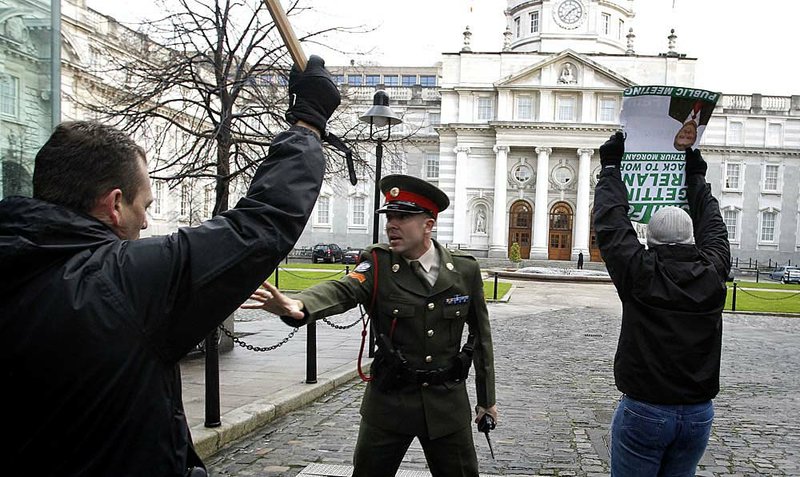LITTLE ROCK — Ireland’s bid for financial aid prompted Prime Minister Brian Cowen on Monday to call elections after support for his government unraveled.
Cowen made the announcement after the Green Party said it would pull out of his coalition. He said the vote will come early next year after passage of a 2011 budget.
A rescue package that Goldman Sachs Group Inc. estimates may total $130 billion failed to damp speculation that Portugal and Spain would follow Ireland in tapping the fund set up by the European Union and International Monetary Fund after the Greece rescue.
“It probably won’t halt contagion,” said Sylvain Broyer, chief euro-region economist at Natixis in Frankfurt. “The sovereign crisis isn’t yet over. Ireland is in the middle of a difficult crisis.”
The aid, which Irish officials said as recently as Nov. 15 they didn’t need, marks the latest blow to an economy that more than doubled in the decade ending in 2006. The bursting of the real-estate bubble in 2008 plunged the country into a recession and brought its banks close to collapse. With Irish bond yields near a record high, policy makers are trying to keep the crisis from spreading.
“Clearly because of the size of their loan books, the huge risks they took, they became a threat not only to the state but to the” entire euro region, Finance Minister Brian Lenihan told Dublin-based RTE radio. “The banks will be downsized to the real needs of the Irish economy” to “Irish consumers and Irish businesses. That has to be the primary focus of Irish banks.”
The United Kingdom and Sweden may contribute bilateral loans, the EU said in a statement. Lenihan declined to say how big the package will be, saying that it will be less than $136 billion. Goldman Sachs Chief European Economist Erik Nielsen said Sunday that the government needs $88.5 billion to fund itself for the next three years and $40.8 billion for the banks.
Talks will focus on the government’s deficit-cutting plans and restructuring the banking system, the EU said in a statement. The deficit will total about a third of gross domestic product this year, including injections to banks.
INTERACTIVE
German government spokesman Steffen Seibert said in Berlin that “tough” conditions should be applied to the aid and that an increase in the corporate tax should be considered.
Irish banks may get immediate capital injections, Matthew Elderfield, the country’s head of financial regulation, said in a speech Monday. The country’s two biggest lenders need at least $6.8 billion immediately, Ciaran Callaghan, an analyst with NCB Stockbrokers, wrote in a note to clients on Thursday.
Ireland nationalized Anglo Irish Bank Corp. in 2009 and is preparing to take a majority stake in Allied Irish Banks Plc, the second-largest bank.
The package for Ireland will total as much as 60 percent of gross domestic product, compared with 47 percent for Greece.
Cowen plans to announce the government’s four-year budget plan this week and said an agreement with the EU and the IMF will come “in the next few weeks.”
“The most important issue is the passing of this budget,” Cowen, 50, told reporters. After that “it’s my intention to seek a dissolution” of the government. When asked about speculation he planned to resign, Cowen said he wanted to continue leading his Fianna Fail party.
Parliamentary support for Cowen evaporated Monday after the Green Party, his junior coalition partners, called for a January election and said he“misled” voters over the past two weeks. Two independent lawmakers have also said they may not support the budget, which is scheduled for Dec. 7.
Irish officials initially resisted pressure from the EU to take any aid, saying they were fully funded until the middle of 2011. European leaders sought to head off contagion from Ireland and reduce pressure on the European Central Bank to prop up the country’s lenders by providing them with unlimited liquidity.
Cowen defended his reversal on the need for aid. “I don’t accept I’m the bogeyman,” he said. “Now circumstances have changed, we’ve changed our policies.”
Activists from the Irish nationalist Sinn Fein party stormed the entrance to Cowen’s central Dublin office Monday and scuffled with police.
Officers clubbed and shoved back protesters with their batons. One officer had a bloody cheek after the melee.
The bailout follows two years of budget cuts that failed to restore market confidence as the cost of shoring up the financial industry soared.
Lenihan canceled bond auctions for October and November and announced $8.2 billion of austerity measures for 2011 on Nov. 4 in a bid to restore investor confidence. Those efforts failed after German Chancellor Angela Merkel triggered an investor exodus by saying bondholders should foot some of the bill in any future bailout.
Yields on bonds of Spain and Portugal have jumped amid concern that fallout from Ireland would spread. The extra yield that investors demand to hold Portuguese 10-year bonds instead of German bonds climbed to a record 484 basis points on Nov. 11.
“Speculative actions against Portugal and Spain are not justified, though it can’t be excluded,” Luxembourg Prime Minister Jean-Claude Juncker said Monday on RTL Luxembourg radio.
Information for this article was contributed by Shawn Pogatchnik of The Associated Press.
Front Section, Pages 8 on 11/23/2010
